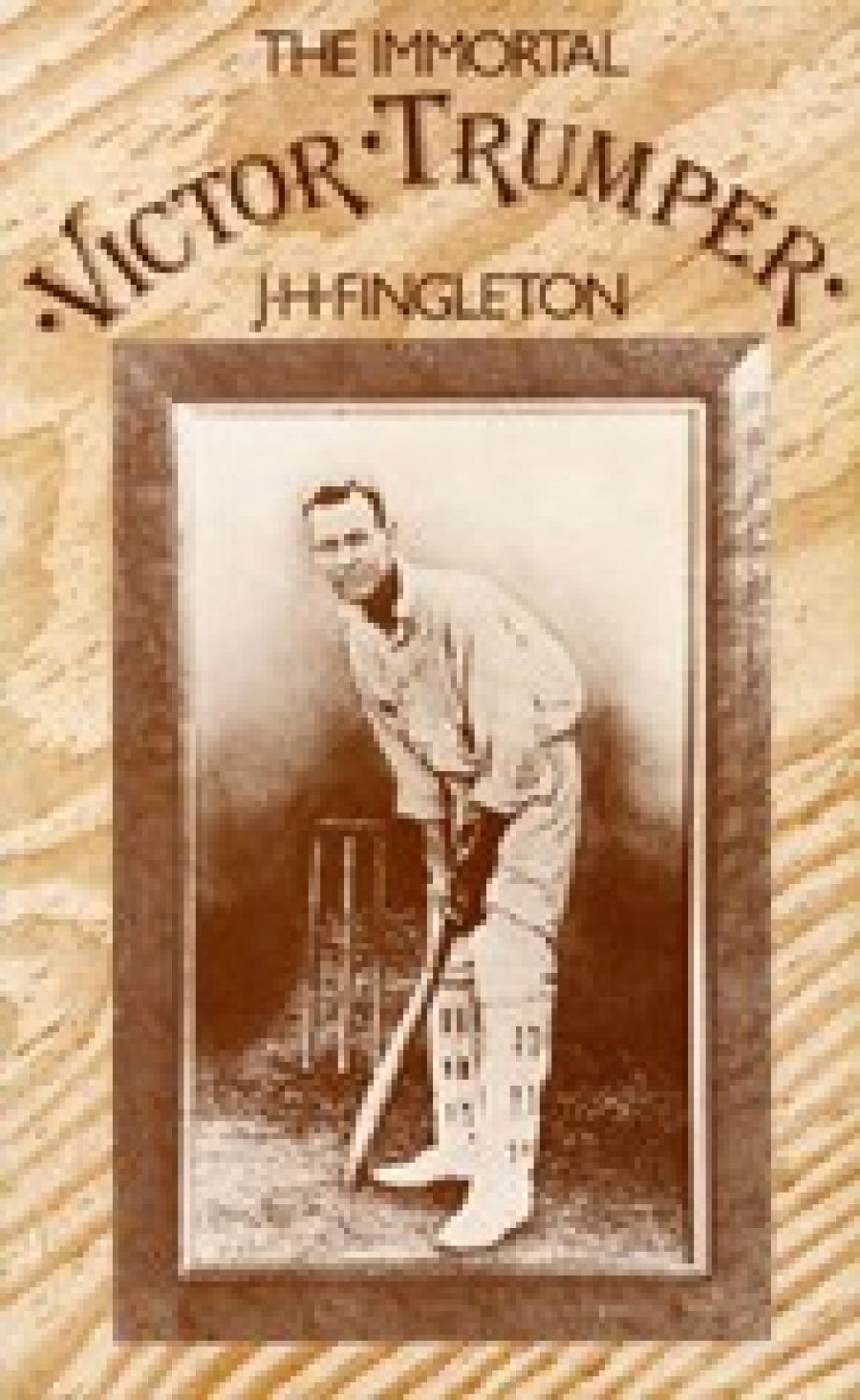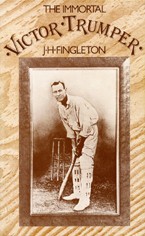
- Free Article: No
- Contents Category: Biography
- Review Article: Yes
- Article Title: Affectionate remembrance and the picaresque digression
- Online Only: No
- Custom Highlight Text:
One of the joys of reading Jack Fingleton on cricket is that the personality of the author illuminates every page. It is not merely that Fingleton’s style is the man himself; his work transcends a Parnassian obsession with manner of expression. Just as one expects existentialism in every scene of a Sartre play and Shavian philosophy in every line of a Shaw prologue, the reader would be disappointed if he did not discover a highly individualistic and forceful viewpoint on cricket eloquently expounded in each chapter of a Fingleton book.
- Book 1 Title: The Immortal Victor Trumper
- Book 1 Biblio: Collins, $15.95 pb, 208 pp
- Book 1 Cover Small (400 x 600):

The book is in many ways a vehicle for the exposition of the author’s opinions. Many paragraphs read like an autobiography and are engrossing enough to capture the interest even of the non-cricketing buff The former Australian opening batsman is brave enough to expound his own theory that Trumper would not have been able to counter the ‘Bodyline’ tactics of Jardine ‘s England side of 1932–23. He is courageous enough to suggest that, because Trumper deliberately practiced on ‘sticky’ wickets prepared by the Sydney Cricket Ground curator, J. Jennings, he was ‘head and shoulders above Bradman’ on such surfaces.
The comparison between Bradman and Trumper is apparently one of Fingleton’s hobby-horses; he devotes an index of a book on Trumper to Bradman ‘s career figures! He quotes, unsympathetically I sense, Bradman as saying: ‘on a percentage basis, Trumper got one century for every 9.8 innings, whereas I obtained one century every 3.4.’ Yet he is fair enough to say of Australia’s cricketing knight that: ‘He was much more consistent than Trumper, with an obviously sounder defence, and in his early days of success was dashing indeed.’ Fingleton ‘s final judgement on the two players, however, allows no doubt as to where his allegiances lie when he says: ‘Bradman rightly contends that runs are the name of the game; in judging batsmanship, however, equally important is how they are made’.
This book will, I fear, rake up the old embers of animosity into fresh flames. It contends that it was Bradman and not Fingleton who ‘leaked’ to the press the story of Woodfull stating to MCC. manager of Jardine’s ‘Bodyline’ team, Plum Warner, that there were two teams out on the field, one playing cricket and the other not. It avers that it was a letter sent by Joe Darling and his side to the Melbourne Cricket Club asking them to invite the England team to Australia in 1911–12 – and not the Australian Board of Control’s rejection of Frank Lavers as manager of the touring side of 1912 – which caused the players’ revolt of the latter year.
Picaresque digressions are plentiful in the book. The opinion that Trumper was a bad businessman is enough to lead the author into the byways of the lot of the professional cricketer in the nineteenth century. where we learn that in England in 1862 there were fourteen ‘pros’ involved in agriculture, seventeen in trade or shopkeeping, fourteen in clothing and textile manufacture, twenty-two who were craftsmen in light industry, two clerks, one college servant and one coachman. These facts may not be germane to the subject of Victor Trumper but they add to the charm of the book.
For those readers who wish to learn of Trumper and not Mr Kerry Packer – who gains a mention – there are facts aplenty. Fingleton painstakingly traces his hero’s evolution from the Sydney suburb of Paddington, through the classes at Crown Street Superior Public School and the playing fields of Centennial Park to his moments of glory on the Test field and his sad premature death. It is a revelation to modern ears to hear of Trumper’s last minute inclusion in the touring side to England –in the face of opposition from Victoria’s Hugh Trumble and after the last trial game between the tourists and the Rest of Australia had been played! In one area, Fingleton is superlative. His analysis of Trumper’s technique, from the batsman’s incomparable drive to his less famous ‘dog shot’. is in the highest class of cricket writing and will claim the rapt attention of the youngest cricket apprentice.
Fingleton’s loves and dislikes are everywhere in this book. I gained the impression that the author’s attachment to the Sydney Cricket Ground is matched only by his affection for his subject: The Immortal Victor Trumper. It is not beyond the bounds of imagination that Fingleton, like one of the little girls whom he describes and who used to attend his daughter’s school, could still bring himself to end each day with the prayer: ‘God bless mummy and daddy – and God Bless Victor Trumper!’


Comments powered by CComment